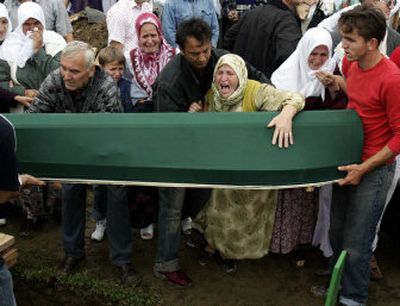Bosnia genocide victims buried

SREBRENICA, Bosnia-Herzegovina — Women wept Monday as they finally buried husbands and sons 10 years after Europe’s worst massacre since World War II — funerals made possible by the excavation of mass graves of victims killed by Bosnian Serb forces.
An extraordinary gathering of 30,000 people — including the president of Serbia — came to Srebrenica to mark the anniversary and honor the dead at a memorial cemetery across from an abandoned car battery factory that was the wartime base for Dutch U.N. soldiers.
The Dutch were supposed to protect Srebrenica — a designated U.N. safe zone— from Serb attacks during the 1992-95 Bosnian war. But outmanned and outgunned, the Dutch mission watched as Srebrenica’s men and boys were separated from the women and led away, to be slain and dumped into shallow graves that are still being discovered a decade later.
To the sound of Muslim prayers echoing across a sprawling green valley, family members wandered among 610 caskets of the most recently identified victims of the July 11, 1995, massacre, in which some 8,000 Muslim men and boys were killed.
After a religious service, the caskets were passed from hand to hand toward the graves and buried beside 1,330 existing graves. The sound of dirt striking the coffins and the weeping of women mingled with a voice reading the names of victims.
Fatima Budic huddled Monday over the coffin of her 14-year-old son Velija before the burial, alone in her grief.
“They killed my entire life and the only thing I want now is to see the guilty ones pay for it,” sobbed Budic. Her husband and 16-year-old son have never been found.
World leaders offered apologies Monday for the inaction of the international community. They called for the arrest of the top war crimes fugitives, Bosnian Serb leader Radovan Karadzic and military commander Ratko Mladic, and their extradition to the U.N. war crimes tribunal in The Hague, Netherlands.
“It is the shame of the international community that this evil took place under our noses,” British Foreign Secretary Jack Straw said. “I bitterly regret this and I’m deeply sorry for it.”
On a fence, victims’ families hung a huge banner with their own count : “Europe’s shame — genocide. 8,106 murdered in Srebrenica.”
The ceremony opened with the Bosnian anthem and raising the Bosnian flag followed by a choral performance of “Srebrenica Inferno,” a song written for the anniversary about a dead boy speaking to survivors.
“Mother, sister, I can’t find you, where are you?” the choir sang, as women in the crowd wept.
“The crimes that were committed here were not simply murders,” said Theodor Meron, president of the U.N. war crimes court. “They were targeted at a particular human group with the intent to destroy it. They were so heinous that they warrant the gravest of labels: Genocide.”
There was no visible presence of Bosnian Serbs at Monday’s service, although Bosnian television aired it live. It was also carried live in Serbia,which confronted the horrors of Srebrenica for the first time only recently when a videotape showing the slaying of six men and boys in Srebrenica shocked residents, who had been largely uninformed about atrocities.